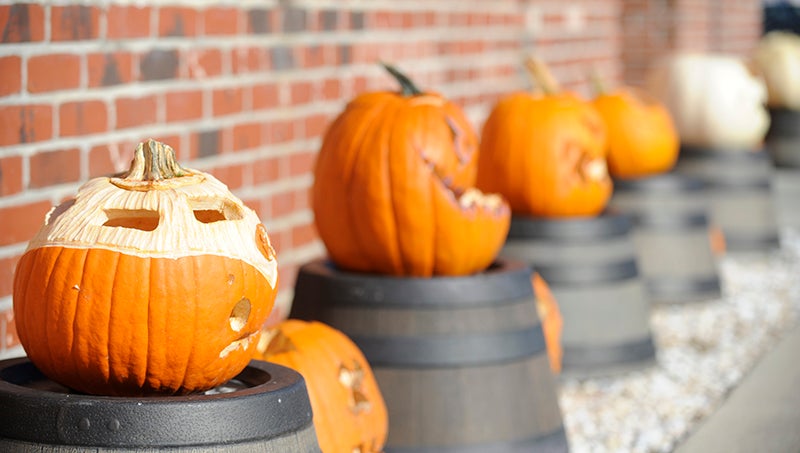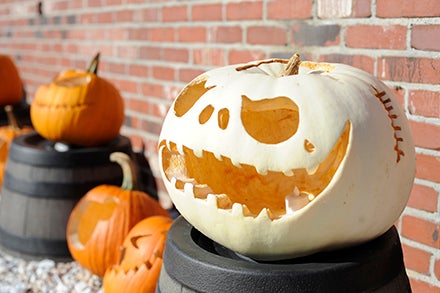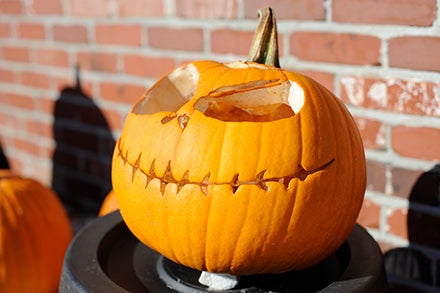How to pick and preserve the perfect pumpkin
Published 7:29 pm Thursday, October 17, 2019

- STEAK OUT: A collection of carved pumpkins can be found on the deck at Ribeyes of Washington on Stewart Parkway. (Vail Stewart Rumley/Daily News)
It seems like it is finally fall! These cool nights and moderate-temperature days feel so good. This is the time of year when we begin to see the fall decorations come out, from hay bales and corn stalks to pumpkins and gourds. How do we make sure our decorations will last?
Getting the most life out of your pumpkin
If you are purchasing your pumpkins, go to a local grower if possible. Ask them if their pumpkins have been cured. Curing preserves the fruit for a longer storage-life. If properly cured and stored, pumpkins can last for up to three months. Check to make sure there is plenty of stem still attached and uniform color. Feel around the fruit to check for any soft spots. Pumpkins with soft spots will rot much quicker. Handle the pumpkins with care, not to bruise or puncture the skin.
What about carving a pumpkin? The biggest concern in keeping pumpkins is preserving moisture loss and preventing pathogens for as long as possible. There are a few steps that we can take at home to aid in our quest to preserve our pumpkin décor for as long as possible.
Steps to preserve pumpkin décor
- Wash your pumpkin in a 10%-bleach solution before carving (9-parts water to 1-part chlorine bleach);
- Make sure the pumpkin is completely dry before carving;
- Handle the pumpkin as little and as gingerly as possible;
- Cut a hole in the rear of the fruit as small as is necessary, instead of the top;
- Remove all of the guts and dry the inside of the pumpkin;
- Once the pumpkin is carved, submerge in a 10% bleach solution for 24 hours, dry completely;
- Seal the cuts with Vaseline or vegetable oil to prevent moisture loss (caution, these products are flammable, do not use a real candle);
- Place the pumpkin in a protected area away from direct sun, rain and frost;
- Use a glow stick or an electric candle to light. Candles create heat, shortening shelf-life;
- Using a spray bottle, spray your creation down with the 10% bleach solution every day.
If you employ all of these, your pumpkin should last between 8 and 11 days so do not carve too soon! If you paint or use markers to decorate your pumpkin it will last much longer. For more information, check the N.C. State Extension Homegrown series on How to Pick and Keep the Perfect Pumpkin. You can find it on YouTube or our Beaufort County Extension Center website beaufort.ces.ncsu.edu/2019/10/pumpkinkeepin/.
Tips for growing pumpkins next year
The perfect pumpkin begins with the grower. If you decide to grow in your backyard, it begins with the right variety for your home garden. This is where you may want to do a little homework and pay attention to the size, 50-pound-plus pumpkins are hard to carve!
Plant pumpkins in an area that receives full sunlight and has well-drained soil. The soil pH should be between 6.0 and 6.5, but, always get a soil test to make sure. Soils with a lower clay content are preferred but heavy soils can be amended with organic matter to work well. Always rotate your pumpkins and other cucurbit crops with non-cucurbit crops to lessen the instance of soil-borne and foliar diseases.
Pumpkins are a longer season crop so the next step in growing your own, is to make sure that you get them planted at the right time and in the right place. Pumpkin cultivars can vary greatly in the length of days until maturity, anywhere from 90 days up to 125 days. According to the 2019 Southeastern U.S. Vegetable Crop Handbook, in eastern North Carolina that time would be between June 15th and July 10th to have pumpkins ready to harvest in time for Halloween.
Harvest pumpkins when uniformly orange and the rind is good and hard by cutting the stem with lopping shears or a sharp knife. Make certain to leave a good portion, typically 3 – 6 inches, of stem attached to the pumpkin. Do not carry your pumpkin by the stem, this can cause bruising or cutting, allowing pathogens to enter the fruit. If fruits are to be used right away, wash them with a 10% bleach solution. If fruit is to be stored, dry the rind and then put in a shed or other place out of sun that maintains a temperature between 70 and 80 degrees for a period of seven to 10 days. This is the process of curing, it will harden the stem and rind even further.
Happy Fall, y’all!
If you have a question to submit, email to Gene Fox at gene_fox@ncsu.edu. If you’re having trouble with growing in your home landscape, call the Extension office at 252-946-0111and speak to an Extension Master Gardener Volunteer, Mondays and Wednesdays between 10 a.m. and noon. There is going to be an Extension Master Gardener Volunteer training series this spring. Learn more on Facebook at the Blacklands Area Horticulture page or visit the Extension Office located at 155 Airport Road!
Gene Fox is the area consumer horticulture agent with the North Carolina Cooperative Extension.







